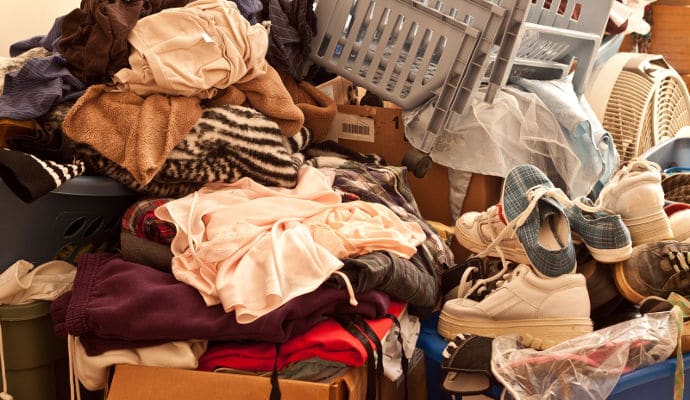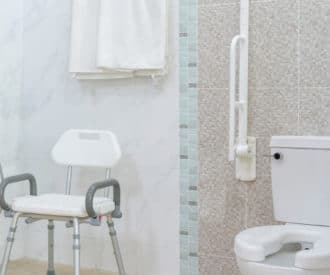
Senior hoarding issues are tough for caregivers to manage, both physically and emotionally. Hoarding can cause safety hazards like increased fall risk, blocked emergency access, and unsanitary living conditions. To help care for a hoarder, New Life Restoration explains the difference between a pack rat and a hoarder as well as the emotions behind the behavior. They also share tips on how to emotionally support a hoarder and get them the help they need to make a change.
Hoarding is especially dangerous for seniors
Hoarding is dangerous for almost everyone, but it’s especially harmful for seniors.
They’re more likely to fall in a crowded home and their health will be harmed by unsanitary or hazardous living conditions.
Senior hoarding issues could also indicate the presence of Alzheimer’s disease, dementia, or mental illness.
In other cases, it could also be caused by Diogenes Syndrome, a condition that affects some seniors near the end of life. Diogenes Syndrome is characterized by hoarding, self-neglect, social withdrawal, and a refusal to accept help.
Hoarding is often accompanied by some degree of anxiety, which makes it difficult to treat – and tough for families to watch. And because hoarders tend to self-isolate, it makes their emotional well-being even more fragile.
When you’re caring for someone who hoards, it’s helpful to learn more about senior hoarding issues.
Understanding the emotional side of this behavior helps you work toward effective solutions in a kind and gentle way.
The difference between a pack rat and a hoarder
Many people like to hang onto mementos and multiples of useful items for both nostalgic and practical reasons.
But there are key differences between someone who collects and someone who hoards.
A hoarder suffers from an inability to discard items and often acquires useless items.
They keep stacks of unnecessary items, like junk mail and old newspapers. They might move things from pile to pile, but will never throw anything away.
Many people have a few items they feel emotionally attached to, but a hoarder has an excessive attachment to many possessions and will be uncomfortable if somebody touches them or asks to borrow their items.
They’ll also feel unable to get rid of any possessions and will end up living in cluttered spaces that are often unsafe, unsanitary, and/or hazardous.
The difference between a collector and a hoarder is that when someone is hoarding, their daily life is negatively impacted.
Trauma can trigger hoarding
Recently, it has been found that people who have hoarding symptoms are also more likely to have experienced a traumatic event in life.
It could be that hoarding is a coping mechanism to deal with grief or loss.
This is important to consider if your older adult has only recently started the hoarding behavior.
They could be trying to fill an emotional hole left by the trauma of losing a spouse, moving to an unfamiliar place, or a similarly significant life change.
The emotional effect of senior hoarding issues
Even though hoarding can be a coping mechanism for dealing with anxiety, trauma, or other mental struggles, it doesn’t provide real relief.
In addition, hoarding behavior often comes with poor decision making, procrastination, and a lack of organization.
These impact all aspects of life and make it more difficult to have good quality of life.
And because hoarding is isolating, seniors who hoard typically have limited social interactions. They may even push you away or avoid you, damaging your relationship.
People’s perceptions of hoarders can negatively impact a hoarder as well. It’s easy for others to see hoarders as dirty or lazy, and those judgments can be difficult for them to hear and handle.
Why do they struggle to let go of possessions?
Hoarding is a complex and layered behavior.
A hoarder could be dealing with any number of symptoms and conditions, from indecisiveness to anxiety and from trauma to social isolation.
Using hoarding as a coping mechanism could mean that there‘s something in the person’s life that is just too painful to face.
Clutter builds up and provides comfort to the hoarder. Letting go of that comfort can feel excruciating.
In fact, hoarders can develop such strong attachments to their possessions that these items become more valuable to them than the people in their lives. Getting rid of something so valuable would feel similar to the extreme grief of losing a loved one.
That’s why if someone forces a hoarder to get rid of these items, their anxiety can intensify to unimaginable levels.
So even though it may seem like the most straightforward solution, do your best to not throw items away without permission or jump into a big cleanup without help from mental health professionals – it would be too emotionally distressing.
And if you do get rid of things without their approval, it will likely make them see you as an untrustworthy person. That makes it harder for you to continue helping them.
Do your best not to judge and remember that they greatly value the items you see as junk.
A hoarder needs professional help to deal with their serious emotional issues before they can cope with cleaning up.
What emotional help do hoarders need?
Not only would a forced cleanup cause extreme emotional distress, the person you care for will immediately return to their hoarding ways and fill up the space again.
What works better is to help your older adult see that hoarding is a problem.
That doesn’t mean shaming the person.
Instead, an empathetic and rational discussion (or several discussions) will help them gain the courage to do what’s best for themselves.
Start by helping them see that a change needs to be made for their own safety.
If the hoarding is linked to a traumatic event, cognitive behavioral therapy (CBT) is often an effective treatment. CBT helps the person cope with the emotions from the trauma and learn to manage their grief in a healthier way.
And even if the hoarding isn’t linked to a traumatic event, therapy can still be helpful. Hoarding can’t truly be fixed until the root of the problem is found and addressed.
For some people, medications that treat anxiety and depression may also be able to help with hoarding disorder.
Above all, be empathetic. Try to understand where your older adult is coming from and listen to what they have to say as you gently guide them towards recovery.
Recommended for you:
- How to Help Seniors Who Are Hoarders
- Prevent Hoarding in Seniors: Watch Out for Clutter
- Increase Senior Independence with This Fall Risk Checklist
Guest contributor: Deborah Lamberton is the general manager for New Life Restoration, a 24/7 disaster cleanup company that offers hoarding cleanup, fire & smoke, water & storm damage, mold remediation and more.
This article wasn’t sponsored and doesn’t contain affiliate links. For more information, see How We Make Money.
[optin-monster slug=”yxbytm35zhsdfopnw7qk”][optin-monster slug=”jvhyplxmb4umsjazxecn”]
About the Author

Connie Chow
Connie was a hands-on caregiver for her grandmother for 20 years. (Grandma made it to 101 years old!) She knows how challenging, overwhelming, and all-consuming caring for an older adult can be. She also knows how important support is — especially in the form of practical solutions, valuable resources, and self-care tips.




